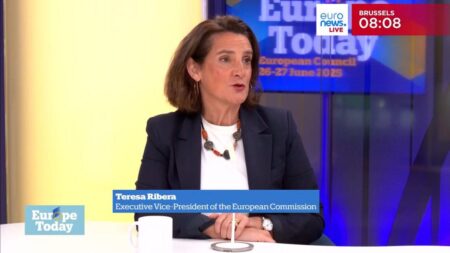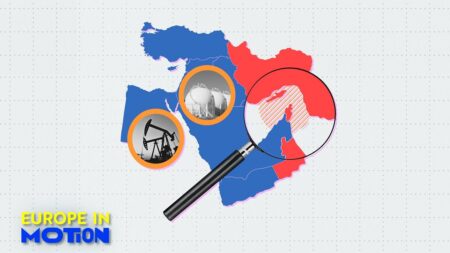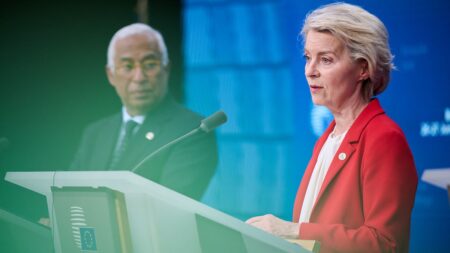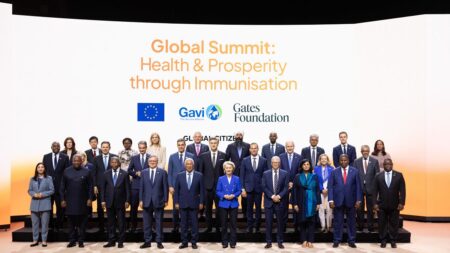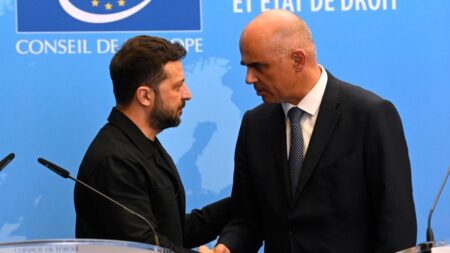A new veto has landed in Brussels.
Robert Fico, Slovakia’s prime minister, confirmed on Thursday that he would continue to vote down the next package of sanctions that the European Union wants to impose on Russia in response to the full-scale invasion of Ukraine.
With sanctions subject to unanimity rules, Fico’s decision makes it impossible to approve the proposal, which is considered ready to go after diplomats spent the last day polishing the technical details in anticipation of a formal endorsement.
Interestingly, Fico’s opposition has nothing to do with the sanctions themselves. It relates to an entirely different matter: the so-called REPowerEU roadmap.
The roadmap envisions a phase-out of all imports of Russian fossil fuels, including pipeline gas and liquefied natural gas (LNG), by the end of 2027. The European Commission unveiled the roadmap in May and presented the draft legislation in June, based on gradual bans on short-term and long-term gas contracts.
“Russia has repeatedly attempted to blackmail us by weaponising its energy supplies,” said Ursula von der Leyen, the Commission president.
“We have taken clear steps to turn off the tap and end the era of Russian fossil fuels in Europe for good.”
As a landlocked country with entrenched ties to Russian fuels, Slovakia immediately – and vociferously – protested the phase-out, warning it would raise prices and endanger competitiveness. Hungary, which is in a similar situation, joined the resistance.
A hot point of contention has been the Commission’s strategy to frame the proposal as trade and energy policy, meaning it will only need a qualified majority to pass through. Until now, the executive had chosen sanctions, a foreign policy tool, as the go-to option to remove imports of Russian fuels, such as coal and oil. Hungary and Slovakia were exempted from the permanent ban on Russian crude oil.
As sanctions on gas remain elusive due to long-standing disagreements among capitals, the Commission took matters into its own hands and envisioned a creative workaround to ensure the prohibition on Russian gas eventually sees the light of day.
The trick infuriated Slovakia, which resorted to vetoing the 18th package of sanctions as a last-ditch effort to extract the concessions that it would otherwise not get.
The colour of money
Fico confirmed his veto after holding a bilateral meeting with von der Leyen on the sidelines of an EU summit in Brussels. In the days leading up to the summit, officials in the Commission had sounded optimistic that a compromise of sorts would be reached and the 18th package of sanctions would sail away before the end of the month.
But then, the Slovak put his foot down.
In a video message posted on his Facebook account in the middle of the summit, Fico aired an extensive list of grievances and reservations regarding the phase-out, indicating he was open to a deal with von der Leyen but at a higher-than-expected price.
“It’s unfortunate that we are heading down this road, as this is clearly an ideological proposal,” he said. “This will harm us, unless an agreement is reached with the European Commission that would compensate us for all the damage this proposal might cause.”
The leader name-checked five issues that he wants to address and, ideally, resolve:
- Transit fees: Fico says that if Slovakia ends imports of Russian pipeline gas, it will have to spend more money on transit fees to bring alternative supplies from Western, Northern and Southern countries, which buy LNG and later gasify it. Fico wants guarantees that future transit fees will have the same cost as with Russia.
- Consumer prices: Fico says the end of low-cost Russian gas, coupled with potentially higher transit fees, will increase gas prices for households “by 30 to 50 percent”, according to the estimates of his government.
- Compensation: As a result, Fico demands “funds to compensate Slovak households and industry, as neither will be able to cope with this burden”.
- Energy crisis: Fico also wants guarantees to protect Slovakia against an extraordinary spike in wholesale gas prices, as happened in the 2022 energy crisis.
- Lawsuits: Finally, Fico warns Slovakia risks facing a lawsuit from Gazprom, Russia’s gas monopoly, worth between €16 and €20 billion due to the termination of its long-term contract, which runs until 2034. Russian energy contracts are generally governed by well-defined “take-or-pay” terms, which means buyers are compelled to either take the agreed-upon deliveries or pay financial damages for their refusal.
“Therefore, this issue must be resolved first,” Fico said at the end of the video.
“Let’s define the solution, and only then can we discuss further sanctions packages. If our proposal to postpone the vote is not accommodated, the Slovak ambassador will receive a clear instruction to veto the adoption of the 18th sanctions package.”
Fico noted he would engage in “constructive negotiations”, with a “special mission” led by the Commission scheduled to travel to Slovakia next week.
It is far from clear how von der Leyen’s team would manage to accommodate his needs, which appear to be worth billions in euros. The bloc’s multi-annual budget is strained and has limited space to cope with unforeseen circumstances or, in this case, demands. The proposed phase-out does not feature a dedicated envelope of EU funds.
Von der Leyen did not address the thorny subject in her press conference at the end of the summit, and the Commission did not immediately reply to a request for comment.
Officials had previously insisted the phase-out would not produce a steep rise in consumer prices because the bloc’s transition away from Russian fuels is already well underway, with greater diversification from Norway, the US, Algeria, Qatar, Azerbaijan and the UK, as well as faster deployment of homegrown green energy.
“We can, indeed, make sure that this transition will happen in a way that it does not lead to an increase in prices and certainly not to a situation of supply issues for these countries,” Dan Jørgensen, the European Commissioner for Energy, said in June.
Jørgensen also stressed that the bans foreseen under the phase-out would be solid enough to declare force majeure – that is, events or circumstances that go beyond the control of the signatories – and protect clients against eye-popping damages.
“We’ve deliberately formulated this legislation and used the legal basis which makes it a prohibition and thereby a force majeure situation for the companies in question,” he said.
“That means they are not legally liable. It’s not them that’s breaking up a contract.”
The reasoning has not entirely convinced experts, who argue traditional foreign-policy sanctions are the most bulletproof method to defy lawsuits in court.
Read the full article here









